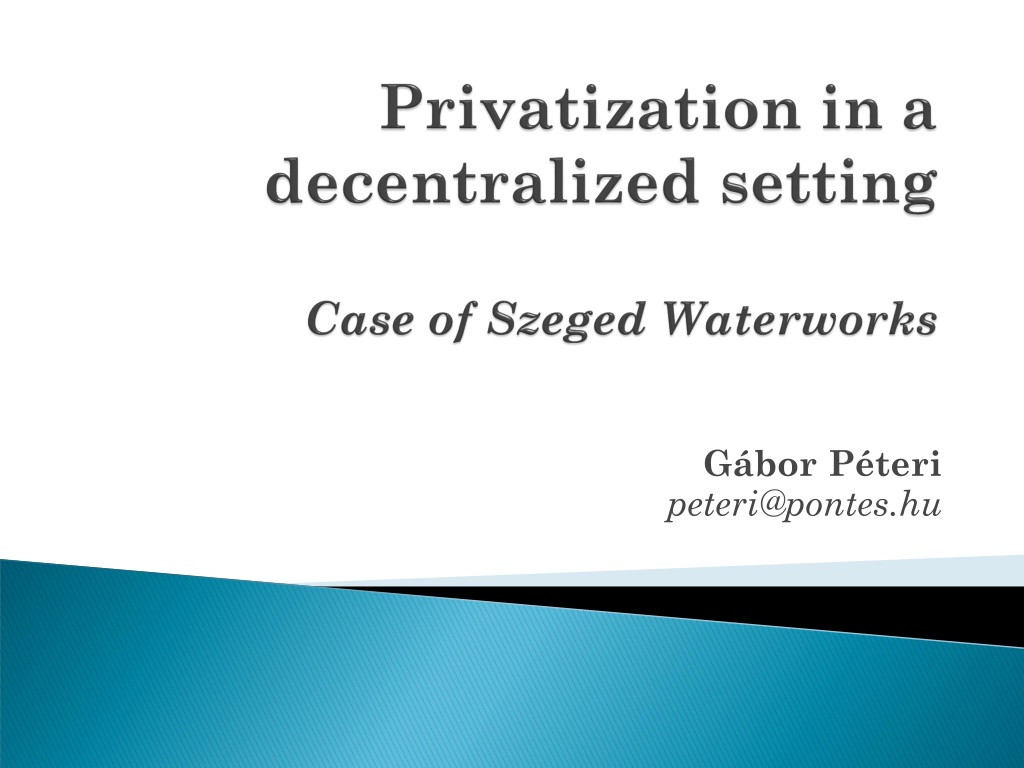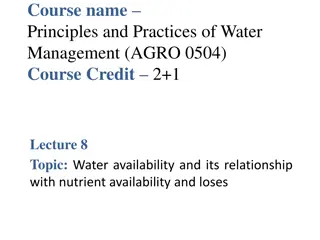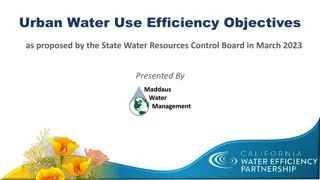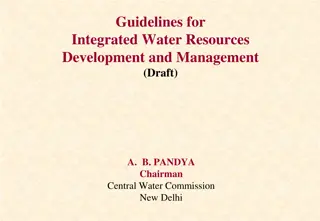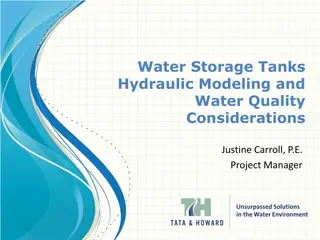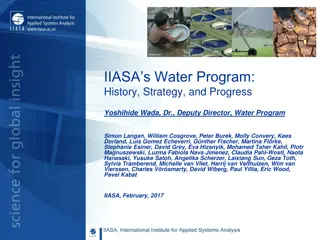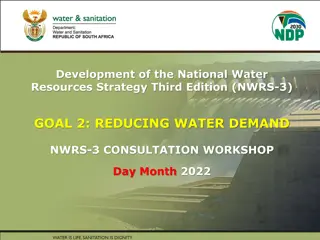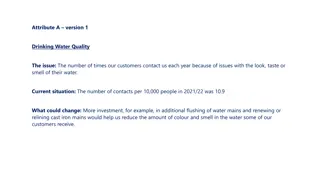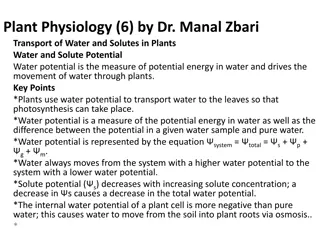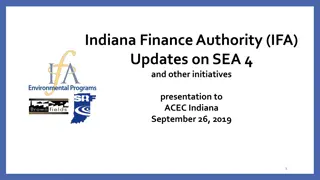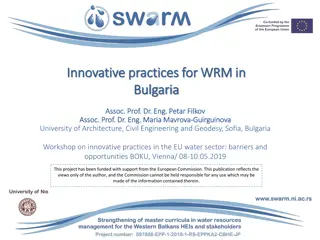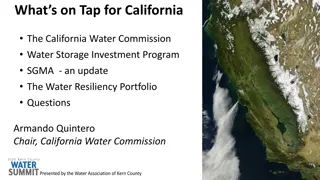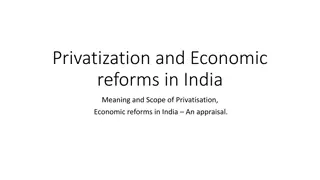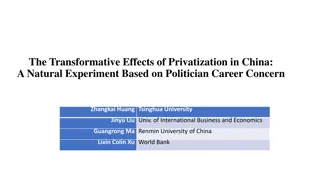Water Management and Privatization Case Study in Szeged
In the city of Szeged, Hungary, the water sector underwent privatization and restructuring between 1993 and 2000. The process involved negotiations, asymmetrical positions, and the involvement of international companies. The management agreements, profit rates, and operational details are explored in the context of privatization's impact on water management. The case study highlights the challenges and outcomes of privatizing water services in a municipal setting.
Download Presentation

Please find below an Image/Link to download the presentation.
The content on the website is provided AS IS for your information and personal use only. It may not be sold, licensed, or shared on other websites without obtaining consent from the author.If you encounter any issues during the download, it is possible that the publisher has removed the file from their server.
You are allowed to download the files provided on this website for personal or commercial use, subject to the condition that they are used lawfully. All files are the property of their respective owners.
The content on the website is provided AS IS for your information and personal use only. It may not be sold, licensed, or shared on other websites without obtaining consent from the author.
E N D
Presentation Transcript
Gbor Pteri peteri@pontes.hu
1) Private sector a) goes for lucrative businesses, only b) interested in short term gains c) benefit a lot from the EU Funds 2) Privatization a) is purely a political matter b) efficiency gains cannot be realized by a municipal co. c) leads to minimal municipal control 3) Contracted services a) are less transparent, so accountability is lower b) corruption risk is higher 2
Favourable conditions: Tisza, artesian water basin, pop. 170K, food processing Loss making public bath is excluded Stage 1., 1993-1999: Szeged WaterWorks Ltd: 49% CGE shares cash and know-how invested affermage : assets remain city owned operation and management agreement (15 years) CGE dominated the board (3:2) 4% profit rate, management fee City Water Investment Ltd: set prices Water Construction Ltd (French dominated): exclusivity for contracts 3
Stage 2. 2000- ex-lex status: blocking registration new city leadership starts renegotiations subsidiaries reorganized: Water utility Mgmt and Development Plc. construction capacity taken over by SzWW renewed framework agreement 10+10 years (optional) plans for joint funding of sewage treatment plant : more balanced relations after contract re- negotiations 4
Stage 1. deal before the local elections (1993) Blocking the legal registration for a term (1999) Renegotiation with the initial leadership (2000) Asymmetrical positions: Lack of experiences and expertise at SzWW Fragmented World Bank expert advice Strategic region for French public investors Influential international company 5
1,200 400 User charges and operational surplus 350 Price setting: two-component tariffs cost based formula fixed part of WCF (33%) Water Construction Fund network rental agreement rental fee depreciation reconstruction(50%):SZWW Development (50%): city Water Committee decision 341 1,000 318 303 300 281 800 250 HUF/m3 HUF Million 231 600 200 193 166 104109116121125135143147157 150 400 101114123133 100 98 89 200 50 0 0 20012002200320042005200620072008200920102011 operational surplus water charges, residential sewage charges, residential Assets managed by SzWW and water production 20 50.0 28.133.438.739.640.4 Water production Assets managed 40.0 15 30.0 8.813.415.418.0 10 20.0 5 10.0 0 0.0 assets managed (HUF Billion) water production, Million m3 6
Pressure for expansion: Algy, four villages sewage network: +40% HUF 32 Billion ( 110M) new assets of 16 Billion=> high amortization costs 9 years contract extension to lower depreciation in tariffs Sewage connection and operational surplus 35,000 1,200 30,000 1,000 25,000 800 connections HUF Million 20,000 600 15,000 400 10,000 200 5,000 0 0 2001 2003 2005 2007 2009 2011 sewage connections operational surplus 7
Usual private company measures: tariff increase layoff staff hire better paid management Szeged Water Works: modest price increase technical staff was kept <=> low labour costs but: higher salaries; international environment, stable middle management 8
Minority owner dominates the Board of Directors appoints the manager influences the Supervisory Board (through employees) City control options: majority owner municipal committees on assets, finances Water and Canal Committee decision on WCF and investments full time urban technical dept. employee 9
1) Confidential, not public: framework agreement management contract network rental agreement 2) Rotating top manager 3) Improved customer service 4) Diverse payment options 5) Advertisement contracts 6) Modest sponsorship (HUF 3-5M): Open air theater, water polo, schools In-kind: local zoo, public well, help in flood protection 10
1) Private sector a) goes for lucrative businesses, only b) interested in short term gains c) benefit a lot from the EU Funds 2) Privatization a) is purely a political matter b) efficiency gains cannot be realized by a muni. co. c) leads to minimal municipal control 3) Contracted services a) are less transparent, so accountability is lower b) corruption risks are higher 11
Unique incentives and accountability schemes influence outputs: Stable funding through WCF (joint interest) Price setting: cost based and (later) capped Benefitting from EU funds => limited expansion Co. interest in minimizing social problems: going after arrears at low level (HUF 10K) Balanced control mechanisms (owner, technical) Local political interest drives decisions Improved knowledge might change attitudes 12
